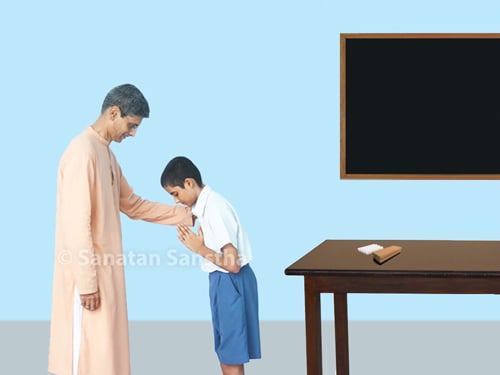Our institution of schooling should lay more emphasis on teaching the students – ‘The aim and purpose of life.’ The schooling processes and curriculum of education should be adjusted accordingly.
One should not mind, if the child doesn’t learn his mathematics or physics. He must learn truth and honesty. Schooling must be based on truth. It is important to remember that health must fail, riches fly away, and happiness is temporary and intermittent, but the character lasts even beyond the grave.
1. What can lead to poor school performance ?
Various factors affecting the school performance of a child are given below :
A. Failure to understand and accept responsibility : Majority of the children with poor school performance are intelligent and have good memory. They can easily score well, if they work hard and concentrate on their studies. However they are not interested in the study because they have not realised the importance of study and their immature mind gets easily distracted by attractions like play, television, companions etc.
B. Intelligence and memory : The child with poor intelligence cannot grasp the subject easily. Some children can grasp quickly but tend to forget easily. On the other hand, a highly intelligent child gets bored with the prescribed study and may start day-dreaming.
C. Defective teaching : Frequent change of school, overcrowded classes, poor standard of teaching, an over strict teacher or a teacher incapable explaining the subject to the pupils, affect child’s school performance.
D. Personality of the child : A lazy, anxious, worried, emotionally upset child or a hyperactive child cannot concentrate in his study.
E. Environmental conditions : A child who is not loved or appreciated for his achievements loses interest in his studies. Children of divorced parents or quarrelsome parents do not have peace of mind. A child who is not happy at home cannot concentrate in his studies. In crowded cities, the child does not get the quiet atmosphere necessary for studies.
F. Bad company : Children with bad company may miss school and go to see movies during school hours.
G. Other interests : Children interested in music, drawing, games or play may spend hours in playing or in other extra-curricular activities. Some children are addicted to seeing video and television and hardly spare any time for study.
2. How should we tackle a child with poor school performance ?
We should always try to find out the root cause and try to correct it.
The following points will serve as guidelines :
A. Impressing the importance of study on the child’s mind : Children should be told selected stories of great scientists, scholars and businessmen which would impress on their mind how they came up in their life because of their studious nature and hard work. There is no substitute for hard work. Hard work for students does not mean simply studying for hours together, but studying for at least 3-4 hours a day with concentration. It is also important to impress upon him that though an important means of begetting worldly pleasures, money does not mean everything in life. It is only the knowledge which is respected by everyone and can’t be snatched away by anyone. The scientist values the joy of invention much more than the joy of all the wealth in the world at his feet. Every student should remember that everyone enjoys the fruits of his own actions and God helps those who help themselves.
B. Intelligence : It is important to find out the intelligence quotient of the child so that we know his capacity to grasp. If the intelligence is low, it is better to accept the child’s limitations and not to overburden him with studies. Ayurveda recommends that cow’s milk, cow’s ghee (clarified butter), dry fruits like walnut and almond, lady’s finger, rice, til (Sesame) and fruits should be included in the diet of students as these food items are good for activities of nerve system.
C. Memory : The following measures help to improve memory.
-
Learning tables of mathematics by heart.
-
Quotations from Holy Scriptures.
-
Simple exercises as given below are helpful
-
Ask the child to note the articles in a room and after two minutes, let him go to next room and write the names of all articles he remembers. Later, let him go back to the first room and find out the articles he has missed.
-
Asking the child to write down at night the important events and the names of persons he met during the day.
-
-
The child should read just before falling asleep what he wants to remember.
-
The child should be asked to correlate some incident or event with the particular person or number which he wants to remember. It is easy to remember the number 1581947 if he remembers that India got her independence on 15th August 1947.
D. Power of concentration : A calm and quiet environment is essential to concentrate. A studious atmosphere at home when brothers, sisters or parents are also reading is conducive to concentrating on studies. Regular meditation that is focusing one’s mind on a target increases the power of concentration.
E. Respect for the teacher : Parents should never criticise the teacher, school or methods of teaching in presence of the child. If a student starts disliking a particular teacher because of adverse criticism, he gradually starts disliking the subject.
F. Special coaching : If a student is weak in a particular subject, he should be given special coaching in that particular subject, so that he understands the basic principles well.
G. Appreciation : Parents should always appreciate the child’s efforts to study and understand the subject. They should never put the child to shame or compare the child with his brother, sister classmates.
H. Correcting vision and hearing : It is better to test vision and hearing in every child with poor school performance as minor defects in vision and hearing often go unnoticed and can affect school performance.
I. Specific learning difficulties : Some children with specific learning difficulties learn better by reading, while others learn better by listening to the teacher. Some children learn better when they are made to write the answers. Special methods, school and teachers may be necessary for such children.
J. Environmental factors : The parents should see that the child remains free from tension, anxiety, and bad company.
K. Nutrition and health : A sick as well as under-nourished child cannot concentrate on study. Hence, it is important to see that the child is free from disease, gets adequate rest and recreation and a balanced diet. A healthy mind can reside only in a healthy body.
3. Why are some children afraid of examination ?
Examination is a stress situation for every student. A slight increase in the tension is an advantage as it increases the concentration and makes the child study for a more number of hours. However, a marked increase in the tension interferes with the concentration and sleep and his study suffers. If the child is weak in his studies, the parents should arrange special coaching for the child. Parents should not criticise child for the result of examination, if the child had studied sincerely and tried his best.
4. Why do some children run away from
school without informing the parents or teachers ?
Some children start from home for the schools at the usual time, but instead of going to the school, spend the day in playing or seeing a movie. They come back home at the usual time. Some children attend a few classes and then go on wandering.
Children of overprotective parents are timid and are afraid of school. Parental indifference makes the child lose his interest in the school and studies. Children of over-ambitious parents who expect too much from the children get frustrated and sometimes retaliate by not attending the school.
It is important to find out the root cause and try to correct it. Stern warning to the child is essential. It is important to follow and keep a watch on the activities of the child every day for a few months; so that the child knows that he cannot deceive his parents or teachers. The problem should be jointly discussed with the child and the teacher and a solution found out.
5. How should teachers and parents handle gifted children ?
Intelligence is inherited and is a gift of God. Highly intelligent children with intelligence quotient of more than 140 are known as gifted children. Such children grasp quickly.
Teachers and parents should consider themselves lucky to have gifted students and children respectively. It is important to provide enough food for thought so that their superior brain does not get stagnated. Children interested in studies should be given special coaching for higher standard and given double promotion. If possible bright students from all divisions should be grouped together so that these students can be exposed to enriched curriculum and programmes. Children having special talents should be trained and given special coaching in music, painting, sports etc. depending on their aptitude. However, teachers and parents should not show any partiality to these children. Gifted children should themselves strive hard to become genius.
6. What qualities are essential in an ideal teacher ?
The teachers’ as well as other elder’s actions are observed by the keen eyes of hundreds of children. They observe the positive as well as negative sides of the teacher’s conduct in the class-room and his attitude towards the pupils. Pupils learn from the actions of teachers. Their receptivity is beyond the stretch of our imagination. Our words subscribe to build their wit, wisdom and personality.
A teacher should enjoy teaching and have genuine love and affection for students. Children like to imitate their teacher. Hence the teacher should be careful about his dress, behaviour and character, selection of words and method of teaching. The teacher should be able to inculcate discipline without being harsh. He must provide fresh food for thought and stimulate independent reasoning and thinking by children.
7. What is the role of school in the development of children ?
Every child spends 4 to 6 hours every day in his school for a period of about 12 years. So, the school exerts a tremendous influence on the development of his personality. Apart from providing knowledge in various subjects, schooling helps to develop thinking, understanding, reasoning, intelligence and memory.
As the child has to reach his school in time and finish his daily homework, he develops a sense of responsibility. At home he is brought up in a protected atmosphere. In the school, he is exposed to his classmates and school-mates, which come from different families and different cultural and socio-economic back-ground. Hence, he gets an opportunity to adjust with children of various temperaments and personalities.
Group play, picnics and camps bring the schoolmates and teachers close together and they learn the happiness of sharing their joy with others. Camps promote weaning from parents. They also promote social adjustments.
Physical training and games in the school help to improve physical health and promote sporting spirit in the child. Health education which includes personal hygiene, principles of dietetics and prevention of diseases, help children in getting insight in maintaining their health.
Creative plays like mechano, arts, crafts and library books help to develop self-sufficiency, self-discipline and will power. Moral education imprints on the child’s mind the importance of higher qualities and values of life.
In short, school provides opportunity for imbibing knowledge, good qualities and values of life and developing good personality. These should be further promoted by parents also. Parents should not throw the entire burden of child’s schooling and personality development on the school.
Reference : Sanatan Sanstha’s Holy text ‘Your child (1 to 12 years)’.


 Sanskar Meaning and Definition
Sanskar Meaning and Definition Despite many births as a Human Being, why do Sanskar have to be made again ?
Despite many births as a Human Being, why do Sanskar have to be made again ? 16 Sanskar – Importance and Objectives
16 Sanskar – Importance and Objectives What is the aim of performing Sanskaras ?
What is the aim of performing Sanskaras ? Garbh Sanskar (Pre-birth Sanskar)
Garbh Sanskar (Pre-birth Sanskar) Discipline children before the child’s birth
Discipline children before the child’s birth